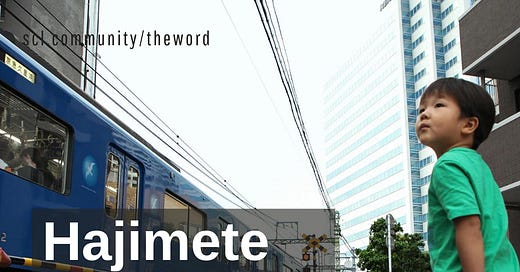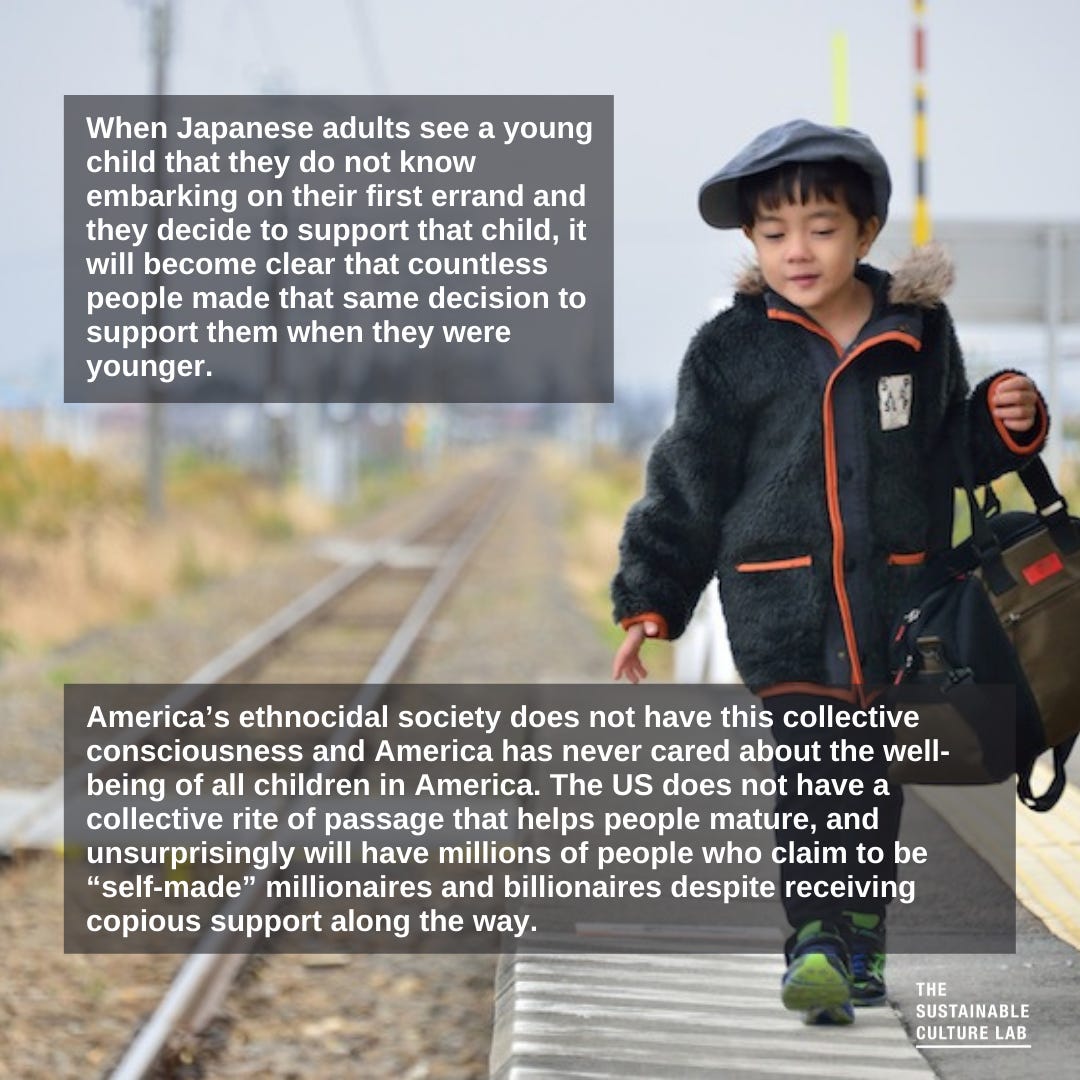Hajimete no Otsukai • noun • (ha-gee-meh-teh no ott-soo-kai)
Definition: “My First Errand”
Origin: Japanese
To help sustain and grow The Word with Barrett Holmes Pitner we have introduced a subscription option to the newsletter. Subscribers will allow us to continue producing The Word, and create exciting new content including podcasts and new newsletters.
Subscriptions start at $5 a month, and if you would like to give more you can sign up as a Founding Member and name your price.
We really enjoy bringing you The Word each week and we thank you for supporting our work.
My book THE CRIME WITHOUT A NAME was released on October 12, 2021 and NPR has picked it as one of the top books of the year!
You can order the book—including the audiobook—and watch recordings of my book tour discussions at Eaton and the New York Public Library at thecrimewithoutaname.com.
About six months ago, I became a parent for the first time, and one of the first things I learned as a parent was that the United States makes parenting far harder than it needs to be. We have all of the resources to make parenting far less stressful, but philosophically America seems to be against engaging in actions that will make parenting easier for everyone.
America’s divisive, ethnocidal society articulates a philosophy where parenting can become easy only once you’ve obtained a certain status and income, but this philosophy basically means that parenting becomes hard for everyone because one must work very hard to achieve and sustain the status that will allegedly provide comfort and security. Discomfort and insecurity is supposed to create comfort and security, and this idea is destructive.
Health insurance, childcare, and parental leave thus become privileges that only some Americans can afford, yet the relative absence of these necessities highlights some of the critical flaws of our ethnocidal society. Our divisive society undermines the cultivation of shared communities. American individualism means that children are no longer raised by a village, but instead solely by their parents and the community and resources that the parents alone have cultivated.
If the parents cannot afford childcare, their job does not provide adequate parental leave, and they have poor health insurance, then our society blames the parents and de facto punishes the children. If these parents do not have a supportive community that can chip in and help, America also blames the parents and de facto punishes the children.
This dynamic has long been the American norm, and we often struggle to imagine what an alternative could look like. This is why the Japanese phrase Hajimete no Otsukai or “My First Errand” is so important. It provides a glimmer of what a better way to live and raise children could look like.
Safe Space
Around the ages of 3 and 4, Japanese children are often sent on their own to run errands for their parents and family members. These young children will be given some money and told to run to the corner store and buy some groceries, for example. It is a cultural rite of passage, and these young children genuinely feel like they have grown and become more independent and mature because of this practice.
There is even a popular Japanese television show called “Hajimete no Otsukai” that films the children as they run their first errand. The show has been on TV for more than two decades, and you can now watch it on Netflix. Strangely the American name for the show is “Old Enough!”
In the show, the children walk down the street and cross the street all on their own. They talk to strangers. If they’re lost they might ask someone for directions. They use public transportation like the bus and subway as they run their errand.
They venture into the world all on their own, accomplish their task, and return home as a more mature and responsible version of themselves. Human civilization has depended upon the cultivation of similar rites of passage so that children can grow into mature and responsible adults, but in the westernized world the emphasis on rites of passage has declined for centuries. Instead the accumulation of wealth has become considered the new rite of passage, and now the world has become increasingly debilitated by immature and irresponsible billionaires.
An immature billionaire is even considered to be a relatable person because we all can’t be billionaires but we can be irresponsible.
Hajimete no Otsukai is a cultural rite of passage that is frankly the opposite of the United States’ status quo. When I was growing up in the 1980s there was a widespread panic concerning child abductions so children learned about “Stranger Danger,” and it was considered irresponsible to leave your child outside without supervision.
Additionally, television shows such as “Unsolved Mysteries,” “Cops,” “America’s Most Wanted,” and “To Catch a Predator” re-enforced the narrative that Americans live in a dangerous, violent society and that people want to harm our children.
All Americans were taught that we lived in a cold, unfriendly, and dangerous society, and also that all of us were obligated to navigate through this inhospitable society for the entirety of our lives. Yet despite being well-aware of our dangerous society, we were also taught that the United States was the greatest country on the planet. If the greatest country in the world was this dangerous, imagine how violent the other countries were?
Hajimete no Otsukai, both the show and the tradition, demonstrate how the real dangers of a society are largely created by the guiding principles and philosophies of that society. If your society values all of its children, it will cultivate spaces and practices that will allow them to mature into adults who retain these values and traditions.
When a Japanese adult sees a young child running an errand, they naturally want to help and not hurt that child because they know that the simple act of running your first errand is a vital part of their shared cultural fabric. When they see this child, they will remember their first errand, and the joy and self-confidence that succeeding in this rite of passage gave them.
When the adult was a child, they had no idea about the collective effort and unity of people that they will never meet that created the environment that allowed them to safely embark on this journey. Therefore, it would be easy for them to imagine that they did everything on their own, and that they are “self-made,” but this is a juvenile perspective that will fade away with age.
When they see a young child that they do not know embarking on their first errand and they decide to support that child, it will become clear that countless people made that same decision to support them when they were younger.
America’s ethnocidal society does not have this collective consciousness and America has never cared about the well-being of all children in America. The United States does not have a collective rite of passage that helps people mature, and unsurprisingly we have millions of people who claim to be “self-made” millionaires and billionaires despite receiving copious support along the way.
Americans embrace the cultivation of a divided and dangerous world, and we struggle to imagine how else to live.
Shared Responsibility & Heroism
In addition to the importance of creating a safe space for children to engage in Hajimete no Otsukai, I appreciate how the rite of passage is also an errand. These children grow into better people by doing something for someone else.
The children are not embarking into the world as some individualistic pursuit. They are not trying to obtain wealth or a degree. They are not trying to prove somebody wrong. They are trying to do something that will benefit another person. This is a heroic endeavor.
According to mythology, the hero is always someone who leaves home and their journey into the wilderness makes them a stronger, wiser, and more knowledgeable person. Yet the journey of a hero does not end with them traversing the wilderness. The story ends when they return home and use their wisdom, strength, and knowledge to improve their home.
The journey of a hero is a collective journey, and the journeys of a villain and an antihero are primarily individualistic journeys.
A villain has no collective consciousness. They leave their home for an individualistic pursuit and their knowledge and strength are used to enrich themselves at the expense of others. In comic books, the villain is frequently a smart person who imagines that the world would be a better place if they were the boss, and their myopic individualism means that they cannot or do not care to see how their individualistic vision harms everyone. The hero is always the person who works to defeat the villain to save humankind and they often need the assistance of a friend or many friends to prevail.
American ethnocide and individualism cultivates a society filled with villains, but we do not consider them to be villains because since the beginning of colonization Americans have been encouraged to be villainous. America is “self-made” at the expense of the people of color, our society has always exploited. The expectation of villainy means that we expect to live in a dangerous society because Americans are encouraged to create this inhospitable, dangerous world.
Yet despite being encouraged to engage in villainy, many Americans do not aspire to become villains, and this is why Americans love the antihero.
An antihero is an individualistic person who embarks on an individualistic journey, but they end up making friends along the way and Americans can now see that they have the potential to become the hero.
A common American antihero is a white person who grew up within a racist community, but then leaves home and becomes friends with people of color. We can see that the antihero can become the hero, and far too often America tragically assumes the inevitability of them becoming heroic.
In America, our growth journeys far too often start from the culture of the villain who has created a divided, unsafe world where children cannot walk the streets alone and it would be considered irresponsible to send a child on an errand for an adult.
Hajimete no Otsukai provides a window into a world where our collective heroic growth journeys take place within a society where children have an abundance of safe space to grow, and take pride in helping their community and their elders.
This is a perspective that all people need, especially Americans, as we work to cultivate Eǔtopian spaces.







Great narrative. I can recall a place and time where children were safe running errands. This place was populated by cousins, aunts, uncles, grandparents, godmothers, godfathers and neighbors. Neighbors made these places safe. A different kind of generational wealth existed in this place. The wealth of security. This village assumed the responsibility for raising all of the children in the village. Not perfect but safe. A place where a ten year old boy could board a bus on his own, go "down town" to make bank deposits and walk home to save ten cents in bus fares.
That extended neighborhood was in the city, not in the suburbs . Somebody on every street knew the family that boy belonged to. Some nosey lady or grand-daddy was watching the streets. That security was a kind of generational wealth that belonged to the village and the children, all of the children belonged to the village.